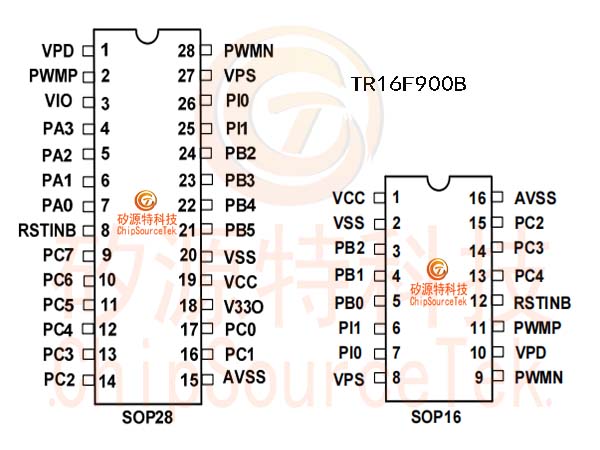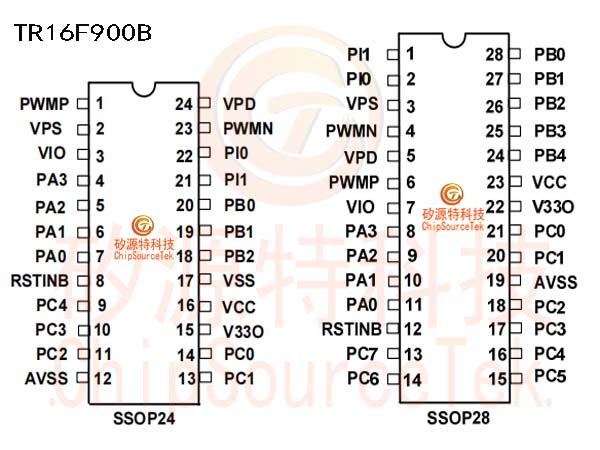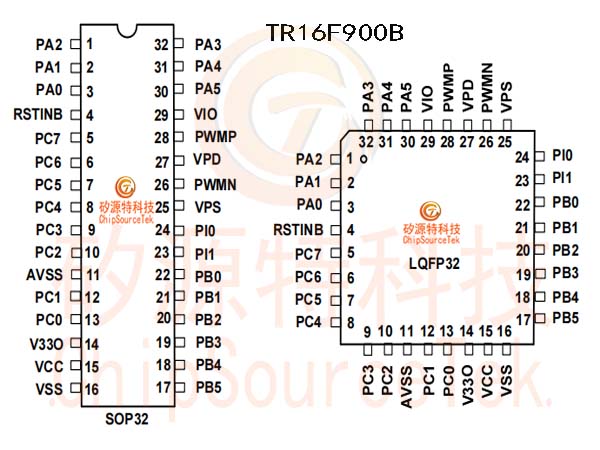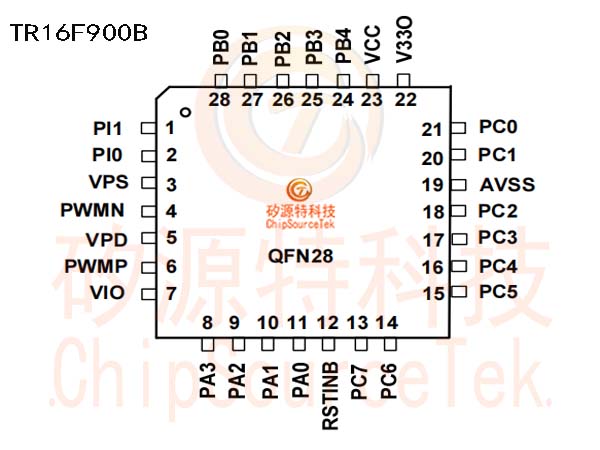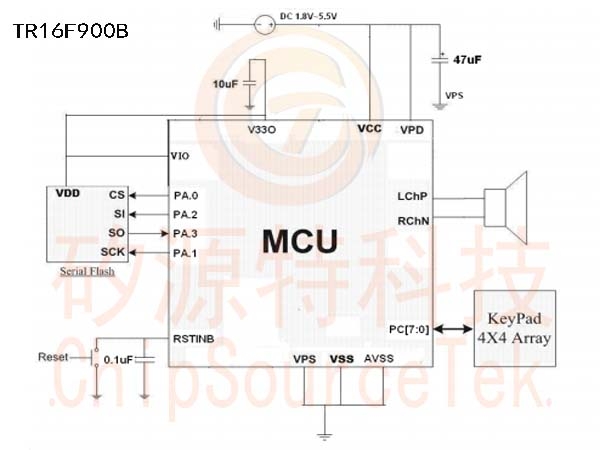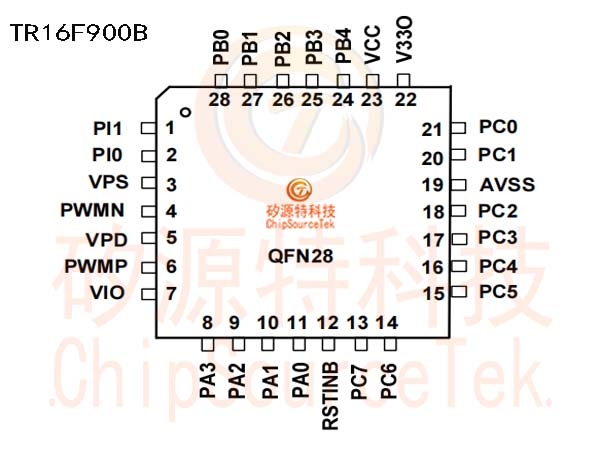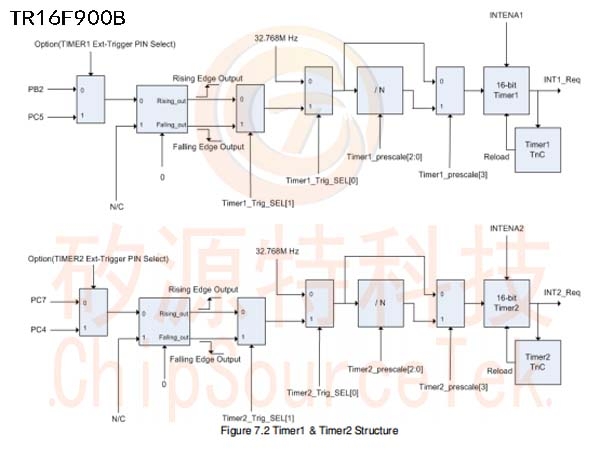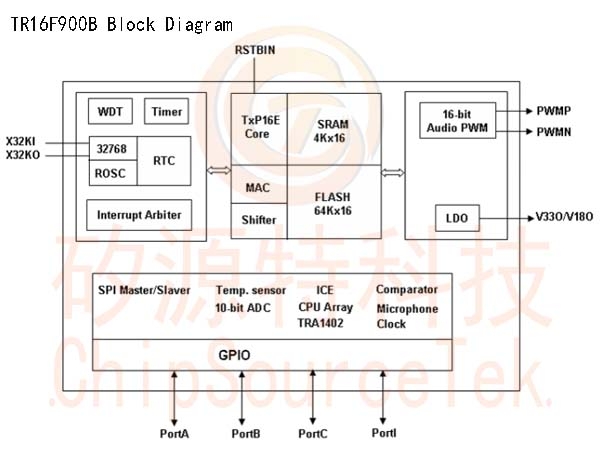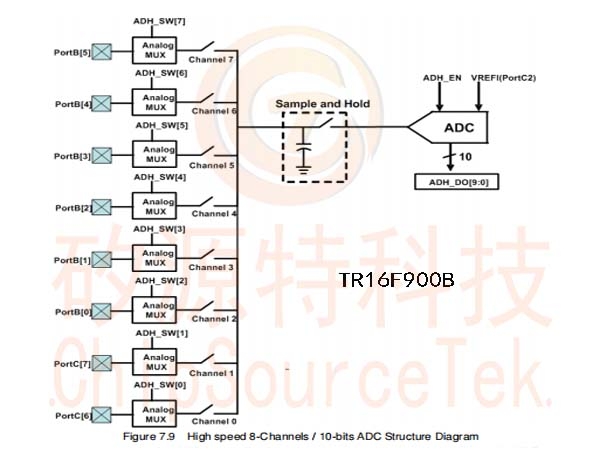TR16F900B General Description:
The TxP16ETM is a high performance 16-bit MCU, running up to 32MHz and provided with 64K FLASH and total 4K SRAM for high performance process of voice recognition algorithm, power control and motor control. It is the new generation computational kernel for Flash DSP series. It has initially aimed at the areas of controller and multimedia digital signal processing (DSP) application to demonstrate its profession. TxP16E furnish with fast MAC architecture, which allows multiplication+accumulation instructions to be issued with access memory simultaneously during one cycles. The TR16F900 is equipped with TxP16E and integrating input/output ports,Audio PWM, Timer and Low Voltage Reset...etc on a chip.
Furthermore, TR16F900 extend its external device connection capability such as Serial ROM/Flash. The internal memory capacity includes 64Kx16 program/data FLASH plus 4Kx16 working SRAM.
TR16F900B Features:
*Voice recognition
*High-performance RISC TxP16E CPU
-wide working frequency and voltage 1Mhz ~32Mhz@1.8Volt ~ 5.5Volt
-2.2 to 5.5 volt for flash erase, and program operations, LVR needs to be set in equal or greater than 2.0V.
-Operation frequency is programmable by Software
-Built-in 4096x16 SRAM
-Hybrid Instruction and data memory share with 64Kx16 Flash ROM
-Embedded PC Stack Level 24
*Rich DSP function
-Hardware Circular Buffer support
-MAC Computation power : 32MIPS (max.)
-Multi-Function Support: In MAC calculation, simultaneously access two operands from memory in one cycle
-Extend Dynamic Range: A 40-bit accumulator to ensure in 512 successive multiple+additions no overflows
*Embedded Flash 64Kx16
-Typical 20,000 erase/program cycles
-Greater than 10 years Data Retention
*Software-based audio processing technical
-Subband, ADPCM , CELP , Melody systhesis up to 20 channels ( Max )
*Support 20+2(ICE PAD can be as I/O) general purpose I/O port, can be configured to open-drain output
*Stereo 8~ 16-bit PWM can be adjustable
*15 IRQ & 1 NMI
-NMI is non-mask interrupt, can interrupt IRQ immediately
-2 external interrupt
*4 bit SPI Master Hardware support DMA transfer
*SPI Slaver
*Green Mode
*Timer1 , Timer2 with Pre-scale
*Low power instruction
*24-Hours / One day Real-Time Clock
*ICE support Data RAM monitor for motor control debug
*Support Spread Spectrum clocking to reduce EMI.
*Watch dog timer (WDT)
*Low voltage reset (LVR)
*Low dropout regulator(LDO) supply 3.3V/1.8V@20mA (voltage drop 0.1v )
*PB0, PB1, PB2, PB3 support two edge modes for wake-up function are rising and falling edge trigger.
*Comparators
*ADC 10bit / 285 kbps(@ACQT = 4*TAD) / 8 channel
*Temp. Sensor
*Microphone
*1402 interface
*New instruction about ACALL, please refer to “TxP16E Instruction Set Reference”
*New instruction about 3OP, please refer to “TxP16E Instruction Set Reference”
*New instruction about Barrel Shifter, please refer to “TxP16E Instruction Set Reference”
*New instruction about Immediate Value CBL, please refer to “TxP16E Instruction Set Reference”
*Notice item about Flash DSP programming, please refer to “Flash DSP Programming Note(AN0060)”
TR16F900B Application Field:
*Voice recognition
TR16F900B Block Diagram:
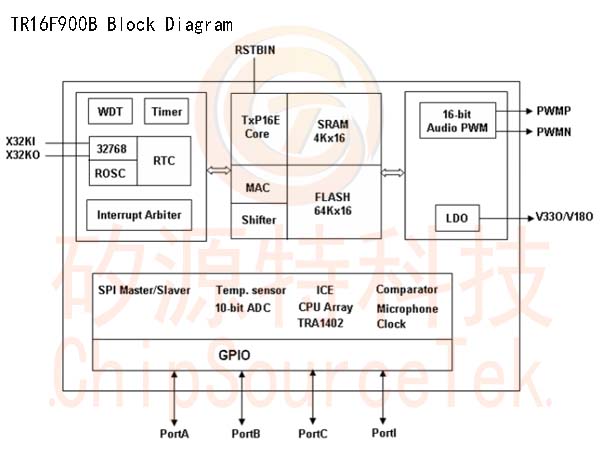
TR16F900B MAC (16-bit X 16-bit Multiplier and Accumulator):
A 16 bit x 16 bit MAC is provided for digital signal processing. The core of MAC operation is multiply MX&MY
with 2’S complement operand and accumulation previous 40-bit MF then rounding store result in the 40-bit MR
register. The basic MAC architecture is shown as Figure 5.5.
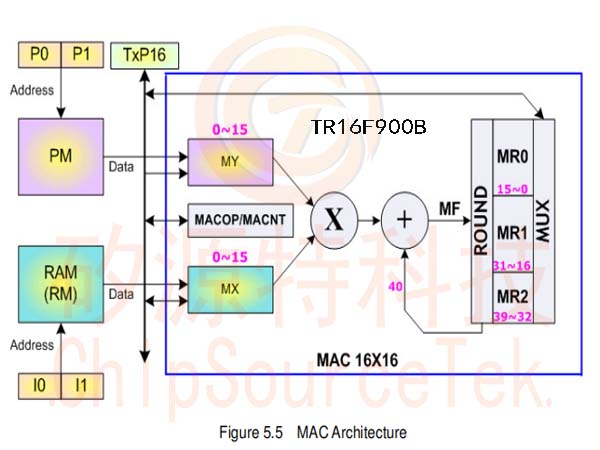
TR16F900B Timer1 & Timer2 Structure:
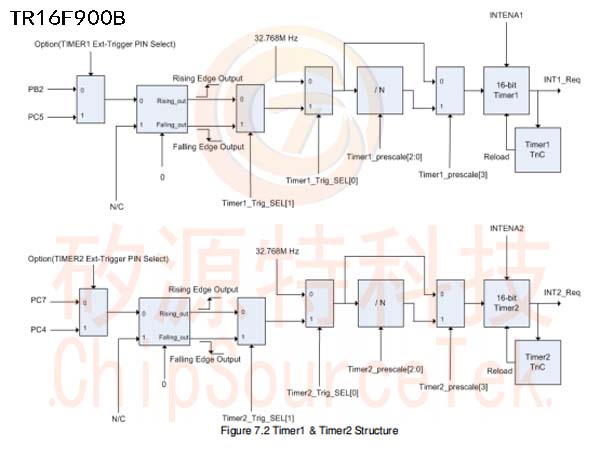
TR16F900B Basic I/O Configuration:
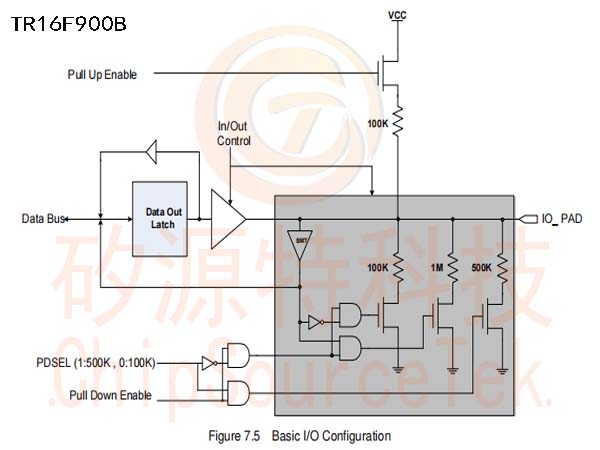
TR16F900B High speed 8-Channels / 10-bits ADC Structure Diagram:
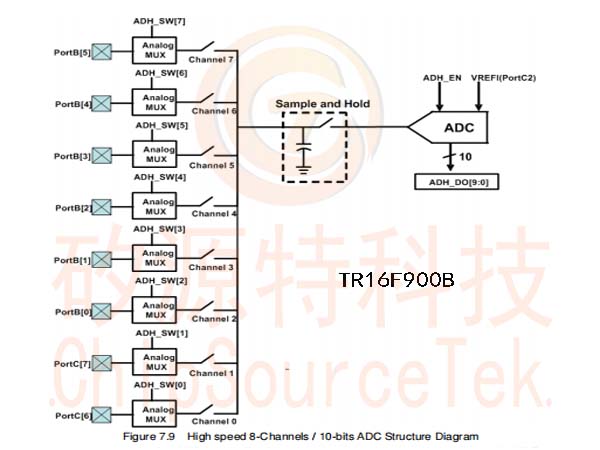
Note: If user need more precise ADC for application, user can set “ADC vref input” to enable VREFI at
option. If ADC Verf input is enabled, PortC2 must be connected 20~100ohm resistor to VCC and 47uF
capacitor to AVSS. Otherwise, IC does not work properly.
Note: Enable ADC verf input at option, PortC2 is as ADC voltage-reference input(VREFI), not as I/O pin.
** The decouple capacitor (10uF) must be as near as possible to VCC and VSS.
TR16F900B Application Circuit:
Application Circuit 1: Stereo 16-bit PWM AMP output with Serial Flash (TYPE1)
Notice:
1. VPD VPS Decoupling Cap 47uF, please close to IC nearly.
2. Power Path of VPD and VPS must pass through Decoupling Cap 47uF into IC.
3. VCC VSS Decoupling Cap 0.1uF, please close to IC nearly.
4. Power Path of VCC and VSS must pass through Decoupling Cap 0.1uF into IC.
5. VSS and AVSS are as close as possible.
6. PCB Layout about power line, Please refer to “Application Note(AN0059)”
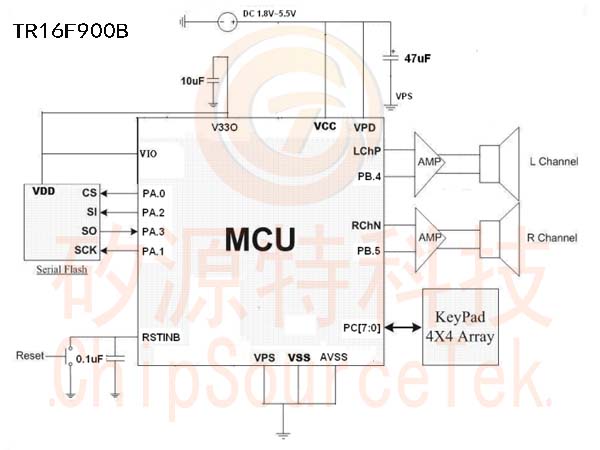
Application Circuit 2: Stereo 16-bit PWM AMP output with Serial Flash (TYPE2)
Notice:
1. VPD VPS Decoupling Cap 47uF, please close to IC nearly.
2. Power Path of VPD and VPS must pass through Decoupling Cap 47uF into IC.
3. VCC VSS Decoupling Cap 0.1uF, please close to IC nearly.
4. Power Path of VCC and VSS must pass through Decoupling Cap 0.1uF into IC.
5. VSS and AVSS are as close as possible.
6. PCB Layout about power line, Please refer to “Application Note(AN0059)”
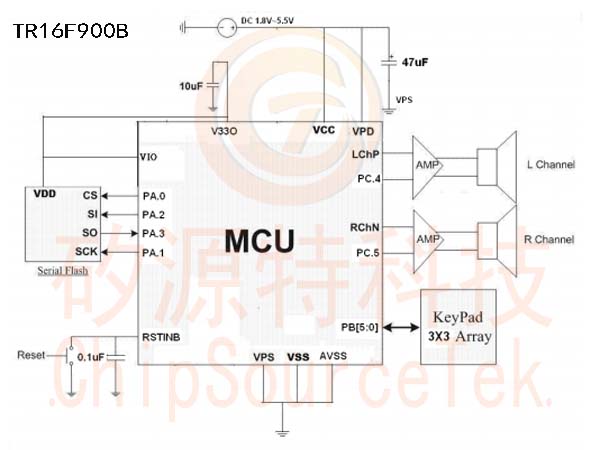
Application Circuit 3: Mono16-bit PWM output with Serial Flash (TYPE3)
Notice:
1. VPD VPS Decoupling Cap 47uF, please close to IC nearly.
2. Power Path of VPD and VPS must pass through Decoupling Cap 47uF into IC.
3. VCC VSS Decoupling Cap 0.1uF, please close to IC nearly.
4. Power Path of VCC and VSS must pass through Decoupling Cap 0.1uF into IC.
5. VSS and AVSS are as close as possible.
6. PCB Layout about power line, Please refer to “Application Note(AN0059)”
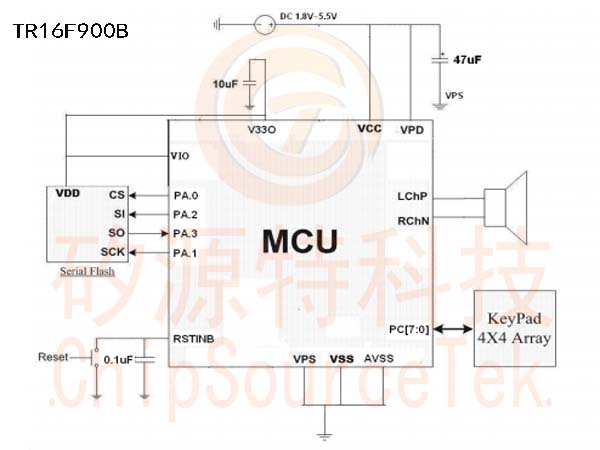
TR16F900B Package:
SOP28/SOP32/SOP16/LQFP32/SSOP24/SSOP28/QFN28
